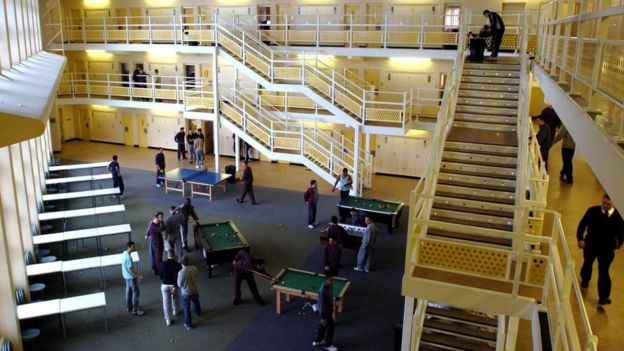
Prison suicides rise to record level in England and Wales
A record number of people killed themselves in prisons in England and Wales in 2016, figures show. The Ministry of Justice said there were 119 self-inflicted deaths – 29 more than the previous year and the highest number since records began in 1978. It also reported a record high of 37,784 self-harm incidents and 25,049 assault incidents. Justice Secretary Liz Truss said prisons faced “long-standing issues that will not be resolved in weeks”. She said the government was investing an extra £100m into the prisons estate, as well as hiring 2,500 more officers.
- What is going wrong with our prisons?
- Video: Cannabis smoking in front of prison guards
- See our special report on prisons under pressure
Last year, thousands of staff walked out in protest over health and safety concerns, amid claims the prison system was “in meltdown” because of overcrowding and staff shortages. A number of serious disturbances also erupted in jails.
The MOJ figures show that in the 12 months to September 2016 there were:
- Seven suicides at Woodhill, in Milton Keynes – the jail with the highest number
- Five in Bristol and four each in Bedford, Exeter, Humber, Leeds and Manchester prisons
- A record 354 deaths in custody overall – up by about a third on 2015
- Three apparent homicides – down from a record eight in 2015
- Nearly 70 assaults every day – the number of serious attacks was up 28%
- 6,430 assaults on staff – up 40% on 2015. Of these, 761 were classed as serious
Peter Dawson, director of the Prison Reform Trust, said reducing the jail population was the “only realistic way to make our prisons safe in the foreseeable future”.
Prisons in England in Wales are at 98% capacity, with 85,058 inmates, according to latest figures. The vast majority of inmates – 81,102 – are men.
Mr Dawson added: “We know that the worst outcomes happen in overcrowded prisons.”
Frances Crook, chief executive of the Howard League for Penal Reform, said suicide rates in prisons were a “national scandal”.
“The suicide rate in prisons is 10 times that in the community. So prisons are actually killing people. That shouldn’t happen in our prisons. People should at least be safe,” she said.
Deborah Coles, director of the charity Inquest which works with inmates’ families, said the prison estate was a “broken system” unable to deal with prisoners’ problems, such as mental and physical ill health and addictions.
“Inquest after inquest highlights the same systemic failures,” Ms Coles added.
‘Desperate need’
Professor Pamela Taylor, chairwoman of the Royal College of Psychiatrists’ forensic faculty, said that the prison estates’ mental health teams were understaffed and struggling to help prisoners in “desperate need”.
She said: “In many cases there is no-one available to escort prisoners to in-prison clinics; from time to time, even when a psychiatrist goes to a prisoner’s cell… there are not enough prison officers present and the cell door can’t be unlocked for safety reasons.”
Her comments came after the Prisons Ombudsman found the criminal justice system “did too little to protect” a vulnerable inmate who electrocuted himself in prison.
The MoJ said the rise in assaults had coincided with major changes to the prison regime, operating arrangements and culture in prisons over the last five years.
It pointed to “restructuring of the prison estate including staff reductions, which have reduced overall running costs, and an increasing awareness of gang culture and illicit psychoactive drugs in prisons”.
The ministry added: “As well as the dangers to both physical and mental health, trading in these illicit drugs can lead to debt, violence and intimidation.”
£1.3bn plans
Ms Truss said she had taken “immediate action” to stabilise the prison estate by tackling issues such as drugs and the use of phones that undermined security.
She added: “These are long-standing issues that will not be resolved in weeks or months but our wholesale reforms will lay the groundwork to transform our prisons, reduce reoffending and make our communities safer.”
In November, Ms Truss unveiled a White Paper detailing a £1.3bn investment in new prisons over five years, with plans for extra officers, drug tests and more autonomy for governors.
The move followed calls from prison governors for an independent public inquiry into the increase in violence and suicides in jails.
Source www.bbc.co.uk


Be the first to comment